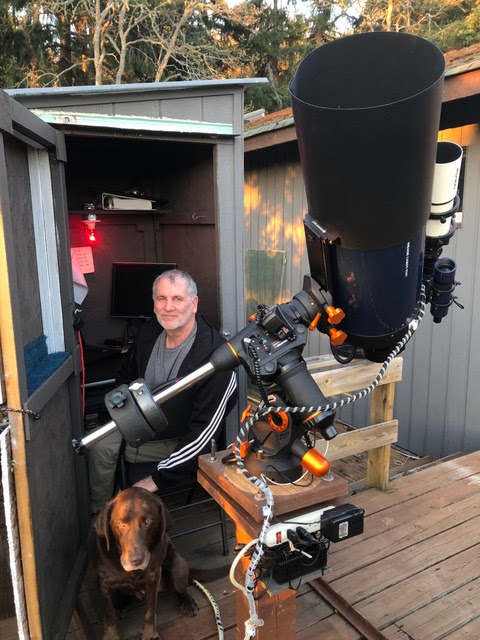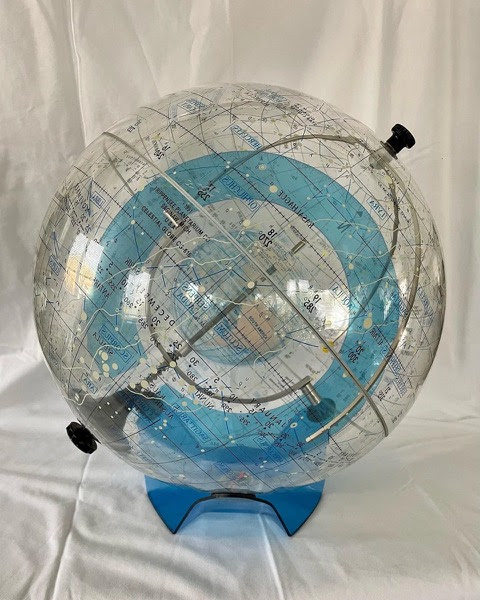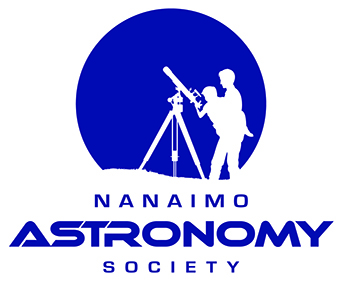
- This event has passed.
May Meeting: Science Education in a Changing World plus The Celestial Sphere
May 25, 2023 @ 7:00 pm - 9:00 pm
Our May hybrid meeting. Online and in person. Society members will receive an email meeting invite.
The public are welcome to attend meeting once for free and then encouraged to join the society.
Main Presentation
We’re very happy to have Carl Savage presenting to us. Science Educator, Ballenas Secondary School
‘Science Education in a Changing World’

Carl Savage and Jasmine at the Nanoose Observatory, Nanoose Bay, B.C. Photo by Vicki Swan
In today’s ever-changing technological society, the skills that drive innovation and define success include problem-solving, critical thinking, creative thinking, and effective communication. In the sciences, these skills combine logic, technology and a pinch of old fashion learning that requires students to have a learning environment and mindset different from those of the past. Using Project Based Learning is one way our classrooms are changing to meet the needs of today’s learners. These changes lead to skill development and understanding that require teachers to be more than traditional teachers. The projects also require students to take on a more significant role in their education than the traditional learner. This talk will explore how these changes are affecting how we teach and how students learn through innovative learning projects, including nuclear reactors, CubeSat and experiments that have run on the international space station, to name a few.Bio :
I became interested in astronomy in the early 1970s when my parents took me to the Calgary Centennial Planetarium. I have worked as an optical and electrical system designer for several national and international companies, never considering becoming a teacher. One of my former managers suggested I consider a career in teaching after watching me do technical training for the equipment I was designing. This interaction set me on a path that led me to teacher training in 2002, and I have never looked back. I have taught Physics, Biology, Mathematics, Calculus, and general science courses at three high schools. I have also designed two original courses for the district I am currently teaching in, Astronomy and Science Research Methods.
As a teacher, I have had the pleasure of teaching many talented students. With my assistance, their hard work and dedication to their education have led me to be nominated for an APEGA teacher excellence award in 2004 and a finalist for the Premier’s Awards for Excellence in Education in 2018. In 2022 I received a Certificate of Achievement in STEM education from the Prime Minister of Canada and a winner of the We Love Teachers from Staples Canada.
Professor, Department of Physics, Engineering & Astronomy
Vancouver Island University‘Holding the universe in your hands: the Trippensee celestial sphere’
Brief:
We live in a time when extraordinary images of our universe are only ever a click away; observatories such as the Keck Telescopes, CFHT, Hubble, James Webb and others produce regular reminders of our modern understanding of the universe and our place within it. So it is perhaps surprising that an early model of the night sky, the celestial sphere, remains a useful concept even today. Join me as I explore its history and use in astronomy, demonstrated using a classic celestial sphere produced in the early 1990’s by Trippensee.
Bio:
Though space has fascinated Greg Arkos since his early childhood, a career in astronomy would only follow later in life. Greg completed a BSc Honours degree in Geophysics at the University of Manitoba before attaining his PhD in space physics at the University of British Columbia. A postdoctoral research position with the Space Research Group at the University of Calgary followed, eventually leading to an ongoing sessional teaching position at Mount Royal College. Greg joined the Department of Physics, Engineering & Astronomy at Vancouver Island University in 2003 as a full-time faculty member and has been happily teaching there ever since! His current interests include all things astronomical, science outreach and the promotion of scientific literacy. Greg was a founding member of the award winning, VIU produced science-themed radio program `Not Rocket Science’. On clear nights he may be found imaging astronomical phenomena of all kinds from his deck or on the roof of the physics building introducing VIU’s astronomy students to the wonders of the night sky.

